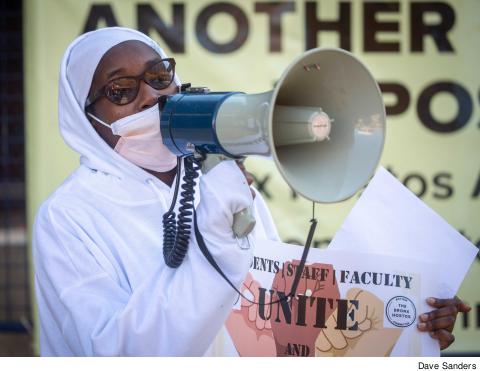Inadequate details on safety measures
 |
CUNY Central is aiming for 70% on-campus work for the Spring 2022 semester, with a minimum of 70% of courses offered in person and professional staff working seven of ten work days on campus. The PSC, along with other faculty and staff advocates, have objected to this “one-size-fits-all” approach, which ignores disparities in safety conditions among CUNY campuses and fails to take into consideration individual faculty, staff and student needs.
Faculty members are eager to return to pre-pandemic “normal” and conduct face-to-face classroom teaching, but many have questions and concerns about the safety protocols on their campuses.
PSC members at Hostos Community College held a rally on November 10 to protest what they believed was the administration’s sluggish response to ensuring a safe campus reopening this Fall. A chapter statement said that the campus administration exhibited a “lack of transparency and clear communication in the reopening process” and “disorganization concerning vaccination policies and modalities of learning.”
CAMPUS MISMANAGEMENT
Craig Bernardini, the PSC chapter chair at Hostos, said that the college had mismanaged the Fall 2021 reopening, lowering confidence that it could handle 70% in-person classes next year.
“Now, instead of learning from their mistakes, they’re gearing up to make an even bigger mess of the Spring,” he said. “We want to be back in the classrooms, here in these buildings with our students, but a series of one-size-fits-all, top-down mandates is not the way to accomplish that.”
The PSC Hostos chapter issued a list of demands for its administration, which included the need “to poll current students to determine their [in-person or online] preferences for Spring and plan accordingly” and assurances “that expectations for in-person, hybrid and ‘HyFlex’ attendance are clearly communicated to students through multiple platforms,” among other demands.
Joan Beckerman, an adjunct lecturer in behavioral and social science at Hostos, said the 70% in-person plan failed to address faculty and student needs not just at Hostos, but elsewhere. “I think these problems are CUNY-wide and will take a CUNY-wide solution,” she said.
At the other end of town, more than 150 faculty members at the Borough of Manhattan Community College (BMCC) signed an open letter, organized in part by the college’s PSC chapter, to demand more remote and flexible work options for the Spring. The letter also reiterated that some PSC members’ requests for accommodations have been “on hold.”
“We ask that vulnerable faculty, staff and students have online options as needed. Yet, chairs have been told that every faculty member must teach at least one class in person in the Spring,” the letter said. “Staff are currently required to come in person, even though they cannot see students in their individual offices because it’s not safe.”
John Verzani, the chair of the College Council at the College of Staten Island and an Executive Committee member of CUNY’s University Faculty Senate, noted that there is wide variation among CUNY campuses regarding physical readiness and staffing when it comes to returning to a 70% in-person teaching schedule.
For example, Verzani said, some campuses like his own have open areas and space to spread out, while some campuses, like Baruch College, are urban, vertical buildings where students and PSC members have often complained about a lack of ventilation and an inability to maintain social distance.
“These decisions should be made locally and not centrally, and each campus deserves the respect to make these decisions on their own,” said Verzani. “Department chairs should be driving it, based on some data.”
A ‘SMART’ RETURN
 |
Verzani added that different schools and departments have different enrollment needs, which may shift throughout the semester. “The schools should have some flexibility,” he said.
A PSC petition on reopening stated that, “the guidance to date unilaterally establishes arbitrary standards that prevent the local exercise of academic judgment and undermine shared governance. The PSC supports a smart and gradual return to work for faculty and staff because we believe CUNY students are generally well served by in-person instruction, advising and counseling.”
REMOTE WORK
The PSC urged “college HR officers to honor remote work requests from employees who live with someone who is immune-compromised, and urge[d] supervisors to extend remote work agreements to staff who would primarily be working remotely (via computer or telephone) despite reporting in person,” and allow departments to use their judgment when it comes to how many classes should be in-person.
The letter added that CUNY should “Count hybrid classes toward the in-person category for Spring 2022, as they were in Fall 2021, and define what qualifies a course as hybrid,” as well as “preserve in-person classes with lower-than-expected enrollments if demand for hybrid or remote sections exceeds demand for in-person sections.” CUNY should also “refrain from offering HyFlex courses absent an agreement with the PSC about the terms and conditions under which instructors undertake HyFlex teaching.”
VENTILATION REPORTS
Resistance to uniform mandates comes in part from members’ unresolved concerns about proper ventilation. According to a union statement, the PSC requested ventilation reports prepared by the engineering consultant firm Ramboll, but many “colleges have failed to provide the data, which is essential to minimizing the risk of COVID transmission.” The union is circulating petitions for the release of this data.
Jean Grassman, the co-chair of the PSC Health & Safety Watchdogs, said this information is important because “CUNY is dilapidated in a lot of ways and HVAC [heating, ventilation and air conditioning] systems don’t often get repaired. They’re kind of invisible. People don’t want to spend money on them, so they tend to be neglected. Because of energy efficiency, they tend to recirculate a lot of air, but it also means that in terms of airborne viruses it’s not a great thing. You can use the filters, but that hasn’t always been the case.”
At City Tech, for example, chapter activists alerted the administration to the existence of mold and raised worries that there are underlying ventilation and plumbing problems in City Tech buildings.
“We’re dealing with a respiratory pandemic,” said George Guida, a professor of English at City Tech, noting that the mold only raised the anxiety levels members already have around COVID.
UNSANITARY CAMPUSES
Karen Weingarten, an associate professor of English at Queens College, told Clarion she was happy to teach in person, but noted that “the number one concern for most people [on her campus] is ventilation, especially since Queens hasn’t given ventilation reports for buildings and classrooms.”
She noted that her and other faculty members believe that cleaning staff is shorthanded, resulting in overflowing trash baskets and dirty bathrooms. “There are so few people around it makes me wonder when the paper towel dispenser was last checked,” Weingarten said.
Scott Cally, the PSC chapter chair at Kingsborough Community College, noted that his campus administration has worked well with his chapter to ensure safety on campus, such as closing off unsafe areas. But even with such measures in place, Cally believes that a 70% in-person teaching rate next semester is impractical.
“The data released thus far on building ventilation is insufficient to determine if our campus is safe for occupancy,” he told Clarion. “The only report provided to the union lists two buildings as Tier 1, but one is completely offline and the other has only limited access to one floor due to the upgrade and replacement of the buildings’ HVAC systems.”
CUNY CENTRAL PROBLEM
For Cally, the flaws in the Spring return plan flow from CUNY Central, not his local administration. “We will continue to stress to our local administration that while CUNY Central’s poor leadership and communication is not [the college’s] fault, it is indeed their problem and it is [our local administration that] the PSC holds responsible for the safety of all members of the campus community,” said Cally.
CUNY Central’s inconsistent messaging about student vaccine mandates have also contributed to doubts that an increase of in-person classes next semester will be smooth.
“I was told three different dates by three different supervisors and/or administrators for the vaccine mandate deadline,” Ian Ross Singleton, an adjunct assistant professor of English at Baruch College, said in recent testimony to the City Council. “There was also little to no messaging about the options faculty had in changing from in-person teaching back to remote.”
All of this underscores the union’s problem with the 70/30 mandate: it lacks any consultation with campus governance or department chairs, resulting in an impractical reopening plan.

